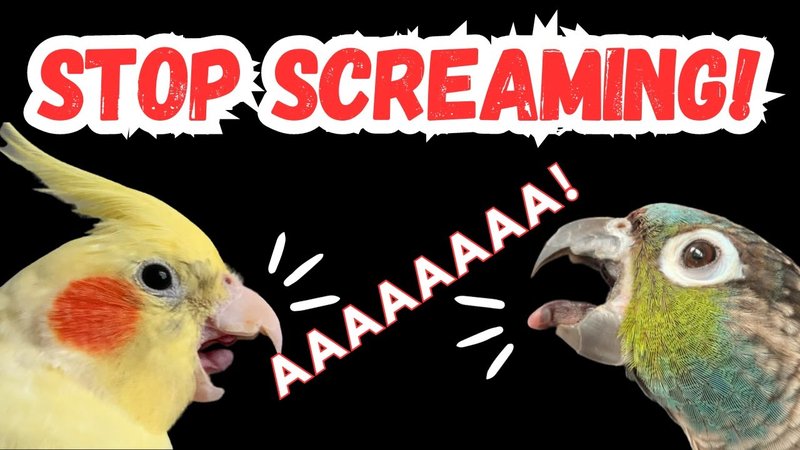
Imagine you’re at a coffee shop, and the barista is shouting orders, making it hard to enjoy your drink. This is a bit like what it feels like when your conure is making too much noise. The good news is that with the right approach, you can reduce that volume and create a more peaceful environment for both of you. Let’s dive into some practical strategies to help you stop a conure from screaming excessively.
Understanding Why Your Conure Screams
Before diving into solutions, it’s essential to understand why your conure might be screaming in the first place. Birds, especially conures, scream for various reasons. They’re social creatures, and their natural behavior includes vocalization to communicate with flock members, which in the wild means their family and friends.
* Attention-Seeking: One of the primary reasons your conure might be screaming is simply to get your attention. If every time they screech, you respond—either positively or negatively—they learn that screaming gets them what they want. It’s a classic case of reinforcement, where their behavior is rewarded with attention.
* Boredom or Loneliness: Conures are intelligent and active birds. If they’re not entertained or have no playmates, they might resort to vocalizing out of boredom. Imagine a child stuck in a room with no toys—what would they do? They’d likely start making noise to entertain themselves or gain attention!
* Stress or Fear: Changes in the environment can trigger excessive screaming. If there’s a new pet in the house, loud noises, or even a change in routine, your conure might feel insecure, leading to loud outbursts.
Creating a Positive Environment
One of the most effective ways to curb your conure’s screaming is to create a positive, stimulating environment. An enriched habitat can distract them and reduce unnecessary vocalizations.
* Toys and Activities: Provide a variety of toys that encourage interaction. Think of chewable toys, puzzles, and climbing structures. Rotate these toys frequently so your conure doesn’t get bored with the same ones.
* Social Interaction: Spend time with your conure daily. They thrive on social interaction, so engaging in playtime or just talking to them can make a significant difference. You might find that a little attention goes a long way in quieting them down.
* Safe Space: Ensure your conure has a quiet, safe area where they can retreat when they feel overwhelmed. Sometimes, just having a cozy spot to chill out can reduce stress-related screaming.
Training Techniques to Reduce Screaming
Training your conure can significantly help tackle excessive screaming. Imagine teaching a puppy to sit—consistency and patience are key. Here are some methods to try:
* Positive Reinforcement: Reward quiet behavior. When your conure is calm and not screaming, give them a treat or praise. This teaches them that being quiet earns them goodies, while screaming doesn’t.
* Teaching Quiet Commands: You can train your conure to understand commands like “quiet” or “enough.” Start by saying the command in a calm voice and rewarding them when they stop screaming. Repetition and patience are crucial here.
* Ignore the Noise: At times, it might be best to ignore the screaming. If your conure realizes that screaming doesn’t get the response they want, they might be encouraged to try being quiet instead.
Identifying Triggers
Every conure is unique, and often, they have specific triggers that lead to screaming. It’s essential to pay attention to what causes your bird to raise its voice.
* Environmental Factors: Keep an eye out for things that might upset your conure. Loud music, vacuuming, or even a neighbor’s barking dog could set them off. Identifying these factors can help you create a calmer atmosphere.
* Routine Changes: If you notice excessive screaming after changing your routine, consider how that might affect your conure. Birds are creatures of habit, and a disruption in their routine can cause anxiety.
* Health Issues: On a more serious note, if the screaming seems sudden or out of character, it might be worth a visit to the vet. Sometimes, health issues can manifest as behavioral changes, including excessive vocalization.
Using Audio Distractions
Believe it or not, sometimes a little audio distraction can ease the noise from your conure. Think of it as background music to drown out the crowd—a useful trick!
* Play Calming Music: Some birds respond well to soothing music. There are even specially designed playlists for birds that can help create a relaxing environment. Chopin’s Nocturnes, anyone?
* Nature Sounds: Consider playing nature sounds like rain or ocean waves. These can be soothing and take your conure’s focus away from screaming.
* TV or Radio: Having the TV or radio on can provide some background noise, which might help your conure relax. It’s like having company over, helping them feel less lonely.
When to Seek Professional Help
If you’ve tried multiple strategies and your conure is still screaming excessively, it might be time to consider professional help.
* Consult an Avian Vet: A veterinarian specializing in birds can determine if there’s an underlying health issue causing the excessive noise. They can also provide behavioral consultations to guide you further.
* Seek a Bird Behaviorist: Sometimes, consulting a bird behaviorist can provide additional insights tailored to your specific situation. They can offer personalized strategies to help reduce your conure’s screaming.
* Join Bird Owner Groups: Connecting with other conure owners can be fruitful. Sharing experiences and solutions with others who have faced similar issues can lead to new ideas and encouragement.
Consistency is Key
At the end of the day, the most crucial aspect of reducing your conure’s excessive screaming is consistency. Just like any good relationship, it takes time and understanding.
* Stick to a Routine: Try to stick to a daily routine. Consistent feeding, playing, and interaction times help your conure feel more secure, reducing the need to scream.
* Be Patient: Real change won’t happen overnight. Remember, it took time for the screaming to become a habit, and it will take time to break it.
* Celebrate Small Wins: Every time your conure is quiet for a bit longer, it’s a win! Celebrate these moments, as they show progress and encourage you to keep going.
In sum, tackling excessive screaming in your conure can be challenging, but with the right strategies and lots of love, you can create a harmonious environment for both you and your feathered friend. It’s all about understanding their needs, keeping things entertaining, and being patient along the way. You’ve got this!

